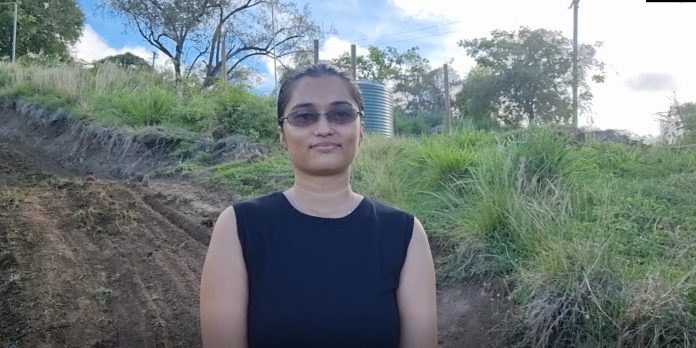Manisha Naidu is a final-year medical student at the Fiji School of Medicine who was born and raised in the community of Tuvu in Ba, Fiji. She, alongside other members of her community, have been affected by inadequate access to sufficient or clean water for many years, due to changing rainfall patterns.
“Many community members have had health problems due to the consumption of contaminated water from hand-dug wells, especially during tropical cyclones and flood events. Furthermore, the wells often dry up during periods of drought,” Manisha said.
Tuvu community members were contracting illnesses, especially water borne illnesses such as typhoid fever and diarrheal diseases. Crops and livestock were also impacted, particularly during periods of low rainfall, leading to food shortages and consumption of unhealthy imported goods, which in turn led to poor nutrition. Responsibility for collecting water, cooking and home gardening, usually falls with women and youth from the community, and so the greatest impact of low supply is borne by them.
In response to these challenges, the 24-year-old Manisha, her community, and the Tuvu District Advisory Committee representatives, submitted a proposal for new water infrastructure to the Office of the Commissioner Western Division. The Commissioner’s Office, with support from the UN Development Programme (UNDP) through the Governance for Resilient Development in the Pacific (Gov4Res) project, worked with the community to refine the proposal to ensure that it was inclusive, and took into consideration climate change and disaster risks both to and from the project. Risk management measures were identified, such as a new, safer location for the borehole and tank, in close collaboration with Water Authority of Fiji.
In April 2021, with support from the Ministry of Rural and Maritime Development and Disaster Management (MRMDDM), the risk-informed water infrastructure was constructed in Tuvu.
Risk-informing development benefits all members of the community
Adopting a risk-informed approach to developing the Tuvu water project ensured the infrastructure would not only withstand future climate change and disasters, but that it was designed in a manner that was inclusive of the needs of all members of the community. In order to ensure development is risk informed, opportunities and risks need to be understood from the perspective of those who will be using the infrastructure. As such, women and marginalised groups held decision-making seats on the project steering committee, co-designing both the infrastructure and the risk management measures from inception to implementation.
“We were involved in each phase of the project cycle where we had an opportunity to address risks to and from the project before they occurred. During our risk screening consultations, we identified the major risks to the project, including strong winds and cyclones, and came up with risk measures using our traditional knowledge. We provided potential locations for the project site, used strappings to secure water tanks, and trained community members to remove solar panels in times of disasters.”
Specifically, safety concerns raised by women and marginalised groups were addressed by installing fencing and security lighting to prevent potential accidents, and the location of the water tank ensured that it was accessible to those in households who will use it most frequently.
As an outcome of this and other community projects in Fiji, the process of risk informing development has also been adopted by the MRMDDM projects teams, including undertaking inclusive consultations, and ensuring climate change, disasters and gender equality and social inclusion are considered throughout the project cycle.
Within a few months after the installation of the water infrastructure, the community noticed a marked improvement in their ability to access clean water, which has been particularly important during the COVID-19 pandemic. Despite being subjected to periods of heavy rain, the infrastructure had not been damaged and the water remained clean. The consistent water supply has had additional benefits, including contributing to improved sanitation in the community.
“We are now able to get water from the tank on our own without needing to go to the wells, which were far away from our homes. The new water infrastructure has also been a great help for us taking care of homestead gardens to support families during the COVID-19 pandemic. Above all, with improved quality of water, we expect less health issues such as stomach virus, which was a common problem when drinking water from the wells”.
Manisha is elated that she was able to help members of her community improve their health through this project. This was one of her goals as a medical student. Manisha and the Tuvu community will continue to invest in managing the risks to and from the water infrastructure to ensure its sustainability.
Background of the Gov4Res Project
The Gov4Res Project is working together with Pacific Island governments to ensure that countries adapt their decision making and governance systems towards more risk-informed development. The Project, implemented by the UNDP Pacific Office in Fiji is partnering with a range of partners including the Australian Department of Foreign Affairs and Trade (DFAT), the Korea International Cooperation Agency (KOICA), the New Zealand’s Ministry of Foreign Affairs and Trade (MFAT) and the Swedish International Development Cooperation Agency (SIDA).
For more information, or media interviews please contact:
•Aqela Susu, Senior Media Officer, Email: aqela.susu@govnet.gov.fj
•Summer Lee, Partnerships and Communications Specialist, Gov4Res Project, UNDP Pacific Office in Fiji, Email: summer.lee@undp.org
SOURCE: UNDP/FIJIGOVT/PACNEWS















